Alzheimer’s disease risk is partly influenced by genetic variants in the APOE gene.
If you want to know whether you are at a higher risk for Alzheimer’s disease, this article will walk you through how to check your 23 and Me or other genetic data for the APOE E4 variant.
Click here to check your genetic data for Alzheimer’s and APOE genotype
Recent articles on Alzheimer’s Disease:
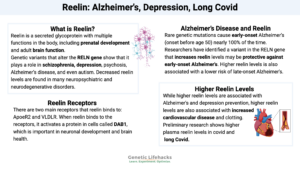 Reelin – Long Covid, Depression, and Alzheimer’s - Reelin is a key glycoprotein involved in brain development, cognition, and neurodegenerative diseases like Alzheimer's, schizophrenia, autism, and cardiovascular health.
Reelin – Long Covid, Depression, and Alzheimer’s - Reelin is a key glycoprotein involved in brain development, cognition, and neurodegenerative diseases like Alzheimer's, schizophrenia, autism, and cardiovascular health. 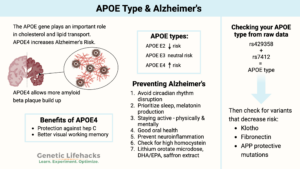 Alzheimer’s Gene: Find your APOE type from your genetic raw data - The APOE gene variants are linked with the risk of Alzheimer's disease. Find out whether you carry the APOE risk type for Alzheimer's - and learn what research shows about supplements and lifestyle changes to prevent this disease.
Alzheimer’s Gene: Find your APOE type from your genetic raw data - The APOE gene variants are linked with the risk of Alzheimer's disease. Find out whether you carry the APOE risk type for Alzheimer's - and learn what research shows about supplements and lifestyle changes to prevent this disease.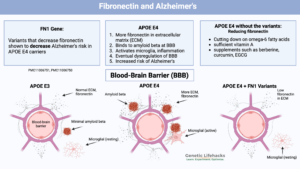 Fibronectin, Genetics, and Alzheimer’s Prevention - Genetic variants in FN1 that reduce fibronectin also protect against Alzheimer's in people with APOE E4. Here's how to check your genes.
Fibronectin, Genetics, and Alzheimer’s Prevention - Genetic variants in FN1 that reduce fibronectin also protect against Alzheimer's in people with APOE E4. Here's how to check your genes.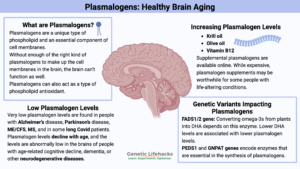 Plasmalogens: Healthy Brain Aging and More - Plasmalogen levels in the brain are key to brain health. Low plasmalogen is linked to Alzheimer's and ME/CFS. Healthy ways to boost your levels.
Plasmalogens: Healthy Brain Aging and More - Plasmalogen levels in the brain are key to brain health. Low plasmalogen is linked to Alzheimer's and ME/CFS. Healthy ways to boost your levels.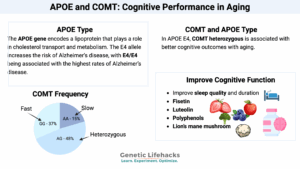 APOE and COMT: Cognitive Performance in Aging - Your APOE and COMT genotypes together may impact memory and cognitive function in older age.
APOE and COMT: Cognitive Performance in Aging - Your APOE and COMT genotypes together may impact memory and cognitive function in older age.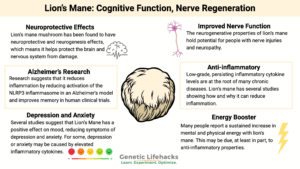 Lion’s Mane: Cognitive function, nerve regeneration - Lion's mane mushrooms have a long history of being used as a medicinal food for increasing energy, improving nerve function, and boosting brain power.
Lion’s Mane: Cognitive function, nerve regeneration - Lion's mane mushrooms have a long history of being used as a medicinal food for increasing energy, improving nerve function, and boosting brain power.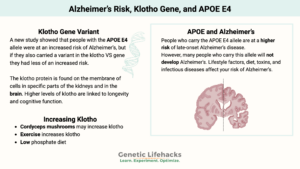 Klotho VS Reduces Alzheimer’s Risk for APOE E4 Carriers - The Klotho protein is involved in many of the diseases of aging. Learn more about this gene and find out how your Klotho variants may impact healthy aging.
Klotho VS Reduces Alzheimer’s Risk for APOE E4 Carriers - The Klotho protein is involved in many of the diseases of aging. Learn more about this gene and find out how your Klotho variants may impact healthy aging. 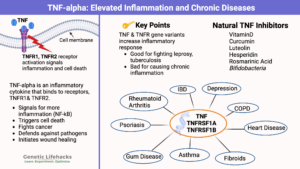 TNF-alpha: Inflammation, Chronic Diseases, and Genetic Susceptibility - Discover the role of TNF-alpha in inflammation and its link to chronic diseases. Learn how genetic variants affect TNF-alpha levels and explore natural solutions for chronic inflammation.
TNF-alpha: Inflammation, Chronic Diseases, and Genetic Susceptibility - Discover the role of TNF-alpha in inflammation and its link to chronic diseases. Learn how genetic variants affect TNF-alpha levels and explore natural solutions for chronic inflammation.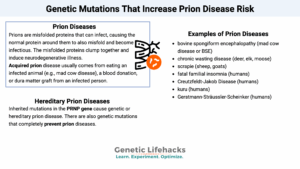 Prions: Genetic Mutations that Increase Prion Disease Risk - Prions are able to infect, causing the normal protein around them to also misfold. These misfolded proteins aggregate to cause neurogenerative disease. Susceptibility to prion diseases depends in part on your genes.
Prions: Genetic Mutations that Increase Prion Disease Risk - Prions are able to infect, causing the normal protein around them to also misfold. These misfolded proteins aggregate to cause neurogenerative disease. Susceptibility to prion diseases depends in part on your genes. 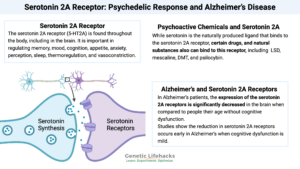 Serotonin 2A receptor: Psychedelic response and Alzheimer’s disease - Learn how new research on brain aging and dementia connects the serotonin 2A receptor with psychedelics, brain aging, and Alzheimer's.
Serotonin 2A receptor: Psychedelic response and Alzheimer’s disease - Learn how new research on brain aging and dementia connects the serotonin 2A receptor with psychedelics, brain aging, and Alzheimer's.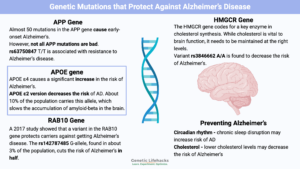 Genetic Mutations that Protect Against Alzheimer’s Disease - Just like there are genetic variants that increase the risk of Alzheimer's, there are also variants that protect against this disease. Check your genetic data to get a better picture of your risk factors. (Member's article)
Genetic Mutations that Protect Against Alzheimer’s Disease - Just like there are genetic variants that increase the risk of Alzheimer's, there are also variants that protect against this disease. Check your genetic data to get a better picture of your risk factors. (Member's article)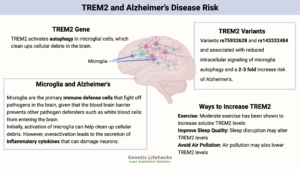 TREM2 and Alzheimer’s Disease Risk - The TREM2 gene is important in how the brain's immune system functions. Learn how variants in this gene impact the risk for Alzheimer's disease.
TREM2 and Alzheimer’s Disease Risk - The TREM2 gene is important in how the brain's immune system functions. Learn how variants in this gene impact the risk for Alzheimer's disease.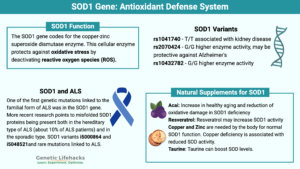 SOD1 Gene: Your Antioxidant Defense System - Our body has built-in antioxidants that fight against cellular stress. The superoxide dismutase enzyme fights against oxidative stress in your cells.
SOD1 Gene: Your Antioxidant Defense System - Our body has built-in antioxidants that fight against cellular stress. The superoxide dismutase enzyme fights against oxidative stress in your cells. 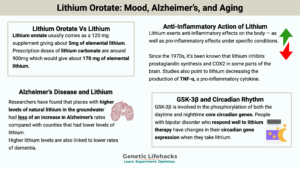 Lithium Orotate: Mood, Alzheimer’s, and Aging - Studies show that lithium in ground water is linked to lower levels of Alzheimers, depression, and aggression. Find out how lithium may be important in Alzheimer's prevention.
Lithium Orotate: Mood, Alzheimer’s, and Aging - Studies show that lithium in ground water is linked to lower levels of Alzheimers, depression, and aggression. Find out how lithium may be important in Alzheimer's prevention.  Melatonin receptor gene: Alzheimer’s risk and night shift work - Shift work and ‘social jet lag’ are linked to an increased risk for several chronic diseases. A genetic variant in the MTNR1A gene impacts melatonin receptors in the brain. (Member's article)
Melatonin receptor gene: Alzheimer’s risk and night shift work - Shift work and ‘social jet lag’ are linked to an increased risk for several chronic diseases. A genetic variant in the MTNR1A gene impacts melatonin receptors in the brain. (Member's article)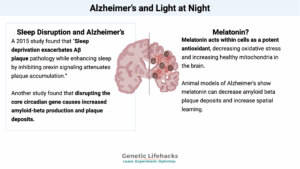 Alzheimer’s and Light at Night: Taking action to prevent this disease - Too much blue light at night is standing out as a player in circadian rhythm dysfunction and can increase your risk of Alzheimer's disease. Discover ways to improve your sleep quality and environment to help lower your modifiable risk.
Alzheimer’s and Light at Night: Taking action to prevent this disease - Too much blue light at night is standing out as a player in circadian rhythm dysfunction and can increase your risk of Alzheimer's disease. Discover ways to improve your sleep quality and environment to help lower your modifiable risk.
